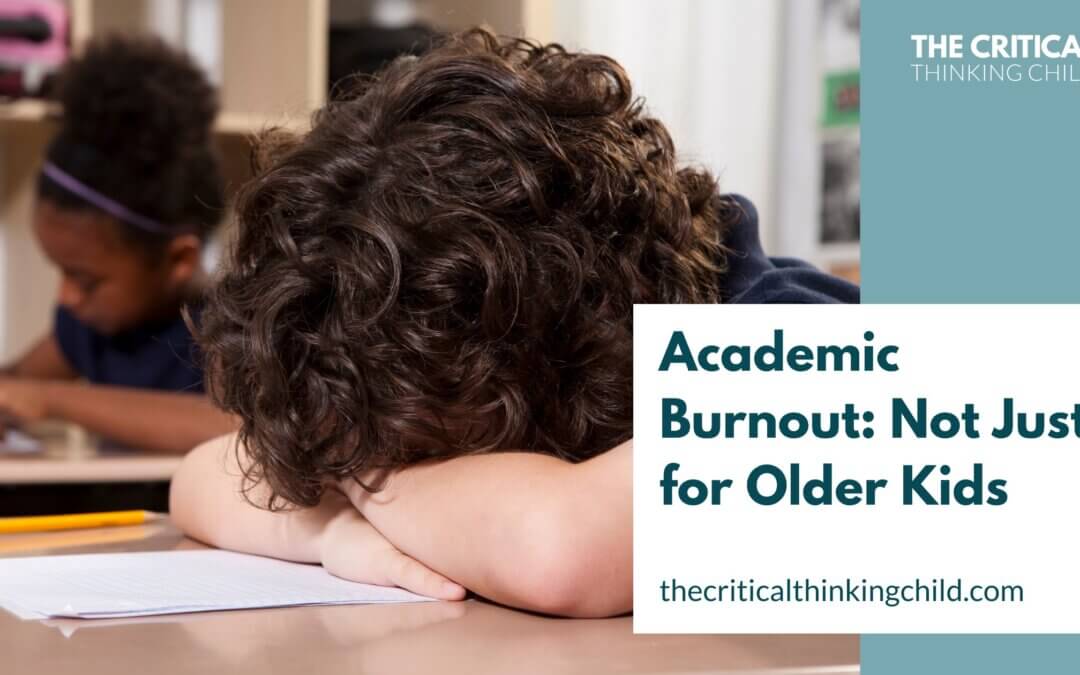When you hear the term academic burnout, do you picture a haggard college student furiously writing papers all night? Many of us think academic burnout is just for older students, but unfortunately, it can affect young children as well. With the return to in-person school after a year of virtual learning, teachers and schools are focused on making up for learning loss, which can result in increased academic intensity that younger students aren’t used to.
What should you look for if you suspect that your child is experiencing academic burnout? And if they are experiencing this kind of stress, what can you do to help?
Warning Signs of Academic Burnout
- Reluctance to go to school: One of the easiest ways to spot academic burnout is reluctance to attend school. If your child constantly says “I don’t want to go,” or seems to have a physical ailment that warrants a sick day, there’s a good chance your child is suffering from academic burnout.
- Physical symptoms: Burnout and stress can manifest in the form of physical symptoms like stomach aches and headaches. If your child is often complaining about these things and there doesn’t seem to be any other medical reason, burnout could be the cause.
- Increased Irritability: You might see your young child having more tantrums than usual, or find your older child seeming more emotionally fragile than usual. There are many things that could cause increased irritability, but academic stress may be a factor, especially if the irritability is paired with other symptoms.
- Decreased self-esteem: Your child might say things like “I’m not smart” or “I can’t do this.” These statements point to a decrease in self-esteem, which can be a result of academic burnout.
- Sleep issues: Burnout can show up in the form of sleep issues as well. Is your child having trouble falling asleep or staying asleep, or are they sleeping much more than usual? Any change in sleep schedule can point to issues with stress and burnout.
Tips for Coping with Academic Burnout
- Create (and stick to) a daily routine. Does homework cause huge headaches after school? Set up a specific time and place for homework, and when that time is up, put the work aside and allow your child to focus on other activities.
- Make time for fun. In addition to a daily routine make sure to set aside time for leisure activities. Just like adults, kids experience burnout when their lives are all work and no play. Make time for a family game night, playing outside, or even just watching a favorite show.
- Have reasonable expectations. Sometimes parents unknowingly add to their child’s stress by having unreasonably high expectations. High standards can be beneficial, but expecting perfection sets everyone up for disappointment. Explain to your child that it’s most important that they try their best, not that every answer is correct.
- Teach stress reduction skills. Children need to be explicitly taught strategies for stress reduction. Talk to your child about belly breathing, progressive muscle relaxation, and other strategies they can use to calm themselves down.
- Talk with a therapist. If your child’s burnout seems to be worsening even after you have tried some of our strategies, consider speaking with a professional therapist.
Talking Points
How should you start the conversation if you suspect that your child is suffering from academic burnout? Here are some talking points you can use as a springboard.
- I’ve noticed that you are _________ (e.g., having more headaches than usual, having trouble sleeping, reluctant to go to school). How are things going at school?
- How does this school year compare to last school year and the years before the pandemic? Are you finding that school is more stressful, less stressful, or the same?
I’m noticing that you seem stressed about school. How can we help with this at home?



